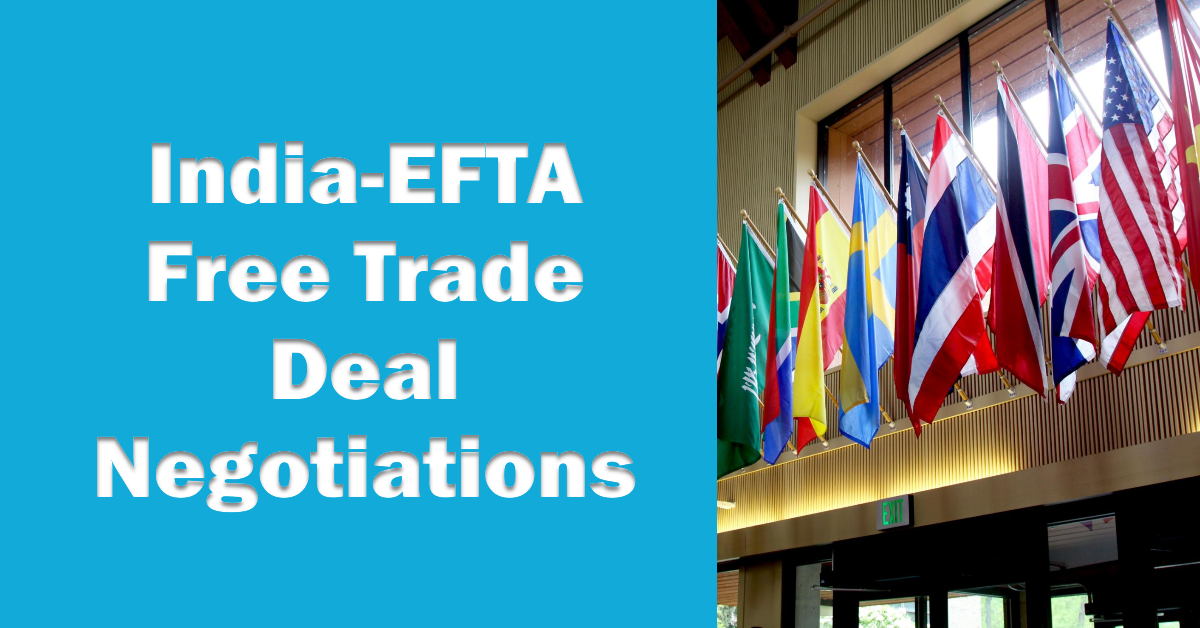The India-EFTA Free Trade Deal Negotiations are still at a deadlock.


Despite ongoing discussions, negotiations between India and the European Free Trade Association (EFTA) have hit a roadblock in their pursuit of a free trade agreement. The impasse reflects challenges and complexities that both parties are grappling with in forging a mutually beneficial trade deal.
Background of India-EFTA Trade Talks: A Complex Landscape
The negotiations between India and EFTA, comprising Iceland, Liechtenstein, Norway, and Switzerland, have been underway for a considerable period. The aim is to establish a comprehensive free trade agreement that would foster economic collaboration and trade relations between the two sides.
Points of Contention: Identifying the Challenges
Several sticking points have emerged, contributing to the logjam in negotiations. Issues related to tariffs, market access, and regulatory frameworks have proven to be significant hurdles. The divergent economic structures and priorities of the involved countries add complexity to the discussions, requiring careful navigation to find common ground.
Tariff Reductions and Market Access: Tensions Surface
The question of tariff reductions and market access has been a focal point in the negotiations. Both India and EFTA seek favorable terms that protect their domestic industries while promoting export opportunities. Balancing these interests has proven challenging, leading to tensions that have yet to be resolved.
Regulatory Frameworks and Standards: Harmonizing Differences
Harmonizing regulatory frameworks and standards is another area where differences persist. Ensuring a level playing field for businesses on both sides involves reconciling diverse regulatory approaches. Bridging the gap between these systems is crucial for creating an environment conducive to bilateral trade.
Economic Structures and Priorities: Finding Alignment
The negotiations also highlight the intricacies arising from the differing economic structures and priorities of the negotiating parties. The diverse nature of industries, services, and agriculture in India and the EFTA countries necessitates a delicate balance in addressing each party’s specific concerns and objectives.
Impact on Bilateral Trade: Assessing the Consequences
The continued stalemate in negotiations raises concerns about the potential impact on bilateral trade. A successful free trade agreement has the potential to significantly boost economic ties, but the current impasse may lead to missed opportunities for both India and the EFTA nations.
Public and Stakeholder Reaction: Awaiting Progress
The lack of progress in negotiations has drawn attention from the public and stakeholders in both India and EFTA countries. Businesses, industry associations, and the broader public are closely monitoring developments, eager for signs of breakthroughs that could pave the way for a comprehensive and mutually beneficial trade deal.
The Way Forward: Navigating Challenges with Diplomacy
As negotiations continue, diplomatic efforts to overcome the impasse are crucial. Finding compromises that address the concerns of both India and EFTA is essential for moving forward. Flexibility, open communication, and a commitment to mutual economic benefits will be key elements in charting a path towards a successful free trade agreement.
Oops! We could not locate your form.